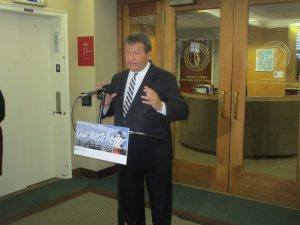Latimer Introduces Plan to Limit County Executive to Two Terms

County Executive George Latimer proposed on Monday limiting holders of the office to two terms to help ensure a greater balance of interest and power between the executive and legislative branches.
Under the measure that would amend the county’s 2011 law that enacted 12-year limits for both the Board of Legislators and the county executive’s seat, holders of the post would be restricted to two four-year terms. Latimer said if approved by the board and signed into law, the measure would apply to himself as well.
He said it is an important step as the executive branch continues to have enormous authority and the ability to exercise influence while the public has increasingly expected higher turnover for many of its officeholders. During one 52-year stretch, only four people held the county’s executive’s chair – Edward Michaelian, Alfred DelBello, Andrew O’Rourke and Andrew Spano.
“I think what we’re watching now is the need for a more robust balance between the executive and the legislative branch and that’s the best way to ensure that decisions are made with the broadest possible input and with the greatest amount of thoughtfulness,” Latimer said.
The proposal is expected to be sent to the Board of Legislators this week. Latimer said he is hopeful that a majority of lawmakers will see the value in limiting the executive’s tenure. He said he has spoken to some legislators and believes there is consensus in support of the new limit, although there are those who are philosophically opposed to term limits.
“I think there’s general support for it,” Latimer said. “We’re not changing legislative term limits and this is to allow a legislator to serve longer than the county executive can serve.”
Legislators can serve up to six two-year terms.
Latimer said that the most common limits for executive posts are eight years, which includes the governors in New Jersey and Connecticut.
“I think an eight-year period of time, given the concentration of power that belongs to the executive, it is a reasonable balance and what it does do is it turns over this position structurally more frequently,” Latimer said.
One disadvantage to limiting county executives to two terms is a greater chance of having a lame-duck incumbent, he said.
Issues that may still have to be worked out is whether an executive who takes over following an incumbent’s death or resignation should be allowed to run for up to two full terms of their own and whether to maintain a hard two-term lifetime limit for former county executives, Latimer said.
Currently, there are only two living former county executives, Spano and Rob Astorino. While he does not expect Spano to run for the office again, Latimer said he would not object to a special rule that exempts Astorino.
Several county lawmakers were called Monday afternoon to get their opinion on the proposal. Legislator Margaret Cunzio (C-Mount Pleasant) responded that while she hadn’t yet read the bill, she supports the concept. Having more frequent open elections would also spur greater interest, she said.
“The forefathers did not want this to be a career,” Cunzio said. “So I think it’s important as a public servant that if you win, you do as much as you can in the position you’re in and then you pass it on to somebody else.”
Outgoing 22-year Legislator Michael Kaplowitz (D-Somers) said he had just heard about the plan earlier in the day and hadn’t yet formed an opinion.

Martin has more than 30 years experience covering local news in Westchester and Putnam counties, including a frequent focus on zoning and planning issues. He has been editor-in-chief of The Examiner since its inception in 2007. Read more from Martin’s editor-author bio here. Read Martin’s archived work here: https://www.theexaminernews.com/author/martin-wilbur2007/
